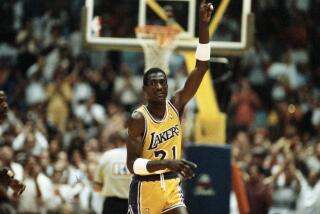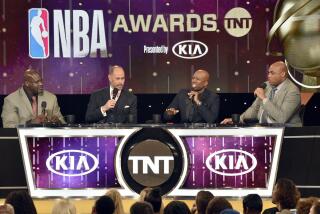He Shouldn’t Make This No. 1 Pick as Stat Symbol
- Share via
Opinions are like free throws in today’s NBA. Everybody steps to the line. Everybody takes shots. Some toss up bricks.
Which brings us to a new book written by sports statistician Elliott Kalb and his selection as the best NBA player of all time: Shaquille O’Neal.
Believe it or not, the book is not titled, “I’m Pulling Your Leg From Here to Staples Center.” Kalb christened his book, “Who’s Better, Who’s Best in Basketball?” with a cover tease that promises, “ ‘Mr. Stats’ Sets the Record Straight on the Top 50 NBA Players of All Time.”
And, still, he went with Shaq as No. 1.
This should greatly interest Laker fans, who watched their team shoot 59% and beat the Memphis Grizzlies by 32 points Sunday night without the presence of the Greatest NBA Player of All Time.
Alert the local radio talk shows too. Their reason for existence -- to argue who’s the best player in town, Shaq or Kobe -- is no longer required.
For Kalb, setting the record straight apparently means low-bridging the myth of Michael Jordan, who dominates these sorts of rankings, in part because he won twice as many NBA titles as O’Neal has with a lesser supporting cast. Also, he made his free throws.
Here, the exercise involves pushing Jordan as far down the list as the limits of absurdity will allow. Which is no further than No. 3.
Now, how to come up with two players “better” than Jordan? Let’s see: Bill Russell won more championships. Wilt Chamberlain remains a revered figure in the sport. Magic Johnson changed the game forever. You might be able to come up with two names that won’t get you laughed out of your neighborhood pub.
But Wilt’s dead, Russell’s old and Magic is now upper management. They are all so 20th century.
Fresh sells. Now sells. Outrageous sells.
So Shaq it is, one notch ahead of Wilt.
I phoned a friend, a lifelong Laker fan, now in his early 40s, old enough to remember the Wilt-West-Baylor days, to tell him about the book. I asked him to guess who made No. 1.
“Jordan?”
“No.”
“Wilt?”
“No.”
“Oscar Robertson?” “Uh-uh.”
“Hmm. How about Magic?” “Sorry.”
“Larry Bird?” “No.”
“Wow. Not Magic. Not Bird. Then it must be Russell.” “No.”
My friend muttered something that won’t be repeated here, then laughed.
“Then it has to be Tom and Dick Van Arsdale,” he quipped.
He kept at it, breaking it down by position.
“Maybe a power forward. Is it Malone?”
Negative.
“A center then. How about Kareem?”
Not quite.
“Not Jerry.”
No, not Jerry West.
Long pause.
“It’s not Shaq.”
Oh yes it is.
“Stop it!” said my friend, the lifelong Laker fan. “That’s ridiculous. What is this guy, 12 years old? Come on. That’s just silly. Shaq shouldn’t even be in the top 10.”
Kalb begins his chapter on O’Neal: “Shaquille O’Neal is the best of the almost four thousand NBA players who have ever suited up in a uniform, and in this chapter, you’ll find out why.”
That’s a mouthful. It’s also an airball. Kalb never follows through with any convincing argument or numbers, promising to “explain why never before in history has the best player in the game been that much better than the second best” -- and then never does.
Kalb doesn’t identify who the “second best” player is. Does he mean Tim Duncan, whom he ranked No. 9?
If so, here are some stats: Duncan won the league’s most-valuable-player award in 2002 and 2003. O’Neal has won the award once, in 11 NBA seasons. Duncan’s team knocked O’Neal’s out of the playoffs last season, en route to a second NBA championship. O’Neal has won three -- all of them alongside Kobe Bryant (No. 18 on Kalb’s list). Duncan won the title last season with Stephen Jackson and a 19-year-old point guard.
Earlier in his career, O’Neal’s leading adversaries included Hakeem Olajuwon (No. 16 in this book), who won as many MVP awards as O’Neal, made the All-NBA first team more times and won two league championships -- one in a sweep over O’Neal’s Orlando Magic.
More stats: O’Neal has never led the league in rebounding. He has led the league in scoring twice -- Allen Iverson has done it three times -- but Kalb argues, “O’Neal would have won three additional scoring titles simply by hitting an average amount of free throws.”
And if the Clippers made more baskets, they would be NBA champions.
Kalb attempts to flesh out his argument with expert testimony. Except: Del Harris, who coached O’Neal, opted for Jordan as his No. 1 player. Rod Thorn went with Jordan, followed by Russell and Chamberlain. Matt Guokas tabbed Chamberlain. Kevin Loughery had O’Neal third, behind Russell and Jordan. Bill Walton said, “For Shaq to be the greatest, he has to play better the rest of his career.”
Joe Maloof, co-owner of the Sacramento Kings, sided with Kalb, going with O’Neal first and Chamberlain second.
“I like the big men,” Maloof said. “Look at this league. The dominant teams have always had the big man -- except the Bulls.”
This prompts the obvious question: Why doesn’t Maloof go out and get a center, then?
Kalb acknowledges that his choice is controversial. At a celebrity golf tournament in 2002, Kalb tried his theory out on Jerry Rice.
“Rice’s jaw dropped,” Kalb writes. “Jerry told me that saying Shaq was better than Jordan was ‘like saying that Kurt Warner was better than Joe Montana.’ ”
That should have tipped off Kalb right there. When you’re a statistician researching the best basketball players of all time, always go with what the football player says.
More to Read
Go beyond the scoreboard
Get the latest on L.A.'s teams in the daily Sports Report newsletter.
You may occasionally receive promotional content from the Los Angeles Times.










